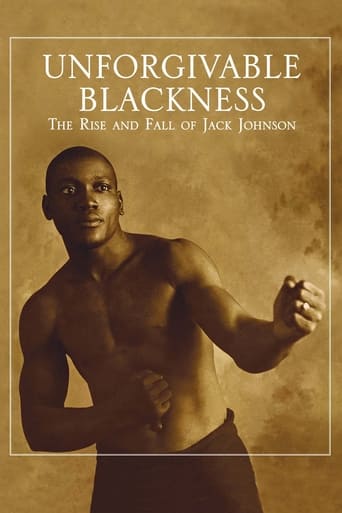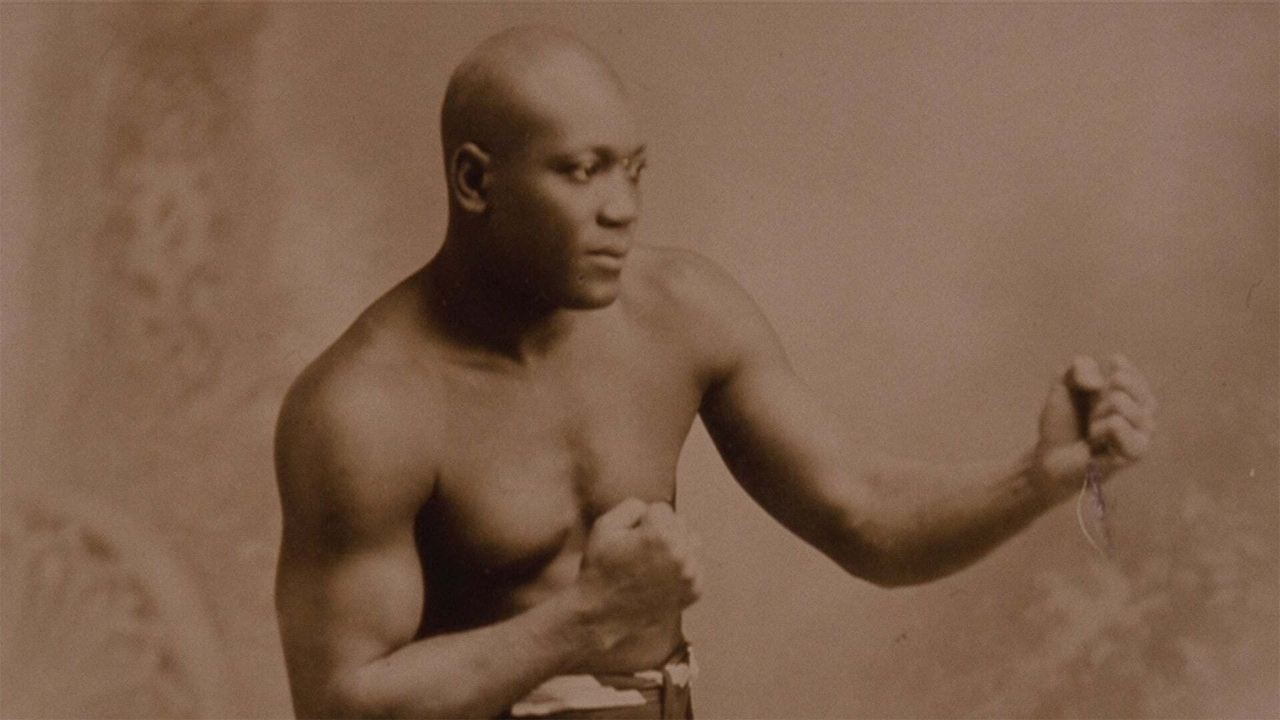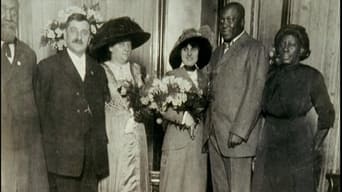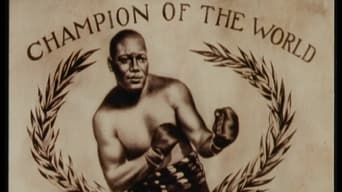bkoganbing
The one thing that did surprise me about this otherwise impressive documentary that Ken Burns put together about Jack Johnson was that he did not use some archival recordings of Jack Johnson and for that matter Jess Willard's voice. Both are available, in fact on one of my vinyl LPs I have them. In the case of Johnson, Samuel L. Jackson captured both his voice and inflections of attitude quite well.When Joe Louis became heavyweight champion it was as much a milestone for racial equality as Jackie Robinson integrating professional baseball. Louis was a man conscious of what this country was around him as was Robinson and sought to become a hero to all. When he knocked out Max Schmeling in that second fight he did just that.Jack Johnson was a man born in a much harder and crueler time when black Americans may have been freed from slavery, but not from the attitudes that engendered it. He was the best at his sport, he knew it and he made sure everyone else knew it. It was only in 1967 that miscegenation laws were finally done away with by the Supreme Court, but in the years Johnson was in his boxing prime they were enforced with a vengeance. It galled a large section of white America that saw him keep public company with white women and even more that he beat just about every challenger black and white thrown at him.Looking at the Johnson-Jeffries fight of 1910 to me it's almost unfathomable that people could have invested so much in Jeffries in their racist hopes. Jim Jeffries licked all before him when he retired in 1905 undefeated in the ring. Probably had he taken on Johnson and such other black contenders like Sam Langford, Joe Jeanette, and Sam McVey he might well have beaten them. But the Jeffries who had been out of the ring for almost six years was never going to take on Jack Johnson in his prime. If anyone bothered to filter through all the racial crap and examined the situation logically no one would have bet on Jeffries.James J. Corbett another former champion who Jeffries beat twice in comeback attempts and who worked to train Jeffries for the bout was accused of racism. Probably so, he like many tossed a lot of racial epithets to get Johnson to lose his cool in the ring, but Burns mentions that Tom Corbett, Jim's brother was the chief bookie for bets on the fight in Reno. There was barely any money bet on Johnson, so the Corbett family may have had racial sympathies with Jeffries, but they would have cleaned up on all the money bet on Jeffries with them.When Johnson did lose to Jess Willard in 105 degree heat in Havana in 1915, he was passed his prime also and the years of high living cost him, probably put him passed his prime a lot sooner than he would have gotten there. Still seven years is a long time to be a boxing champion in any division. I remember as a kid when film of the Willard-Johnson fight were discovered, having thought to have been lost for years, Jess Willard was still alive and somewhat vindicated that he in fact won a clear victory despite all the rumors that Johnson had thrown the fight. It was 26 rounds in that tropical heat and Willard just outlasted Johnson, the same Johnson outlasted an over the hill Jim Jeffries.Why the heavyweight division was so racially sacrosanct was still a mystery. Joe Gans and Lampblack Joe Walcott were lightweight and welterweight champions at the time Johnson was champion and while life was no bed of roses for either of them, they never encountered the animosity that Johnson faced. He did in fact not fight those boxers I mentioned before when he won his title. The white champions didn't fight for racial reasons, but Johnson wouldn't fight them because they wouldn't draw any kind of gate. Sad, but he was right on the economics.It was also mentioned that he wanted to fight Jack Dempsey in the Twenties. Quite frankly if he couldn't take Willard, he would have been slaughtered by Dempsey in his prime. But Dempsey also refused to fight a great black heavyweight named Harry Wills who was left begging for a title shot and Wills would have been a match. The first black on black heavyweight title fight was when Joe Louis fought John Henry Lewis for the title in the late Thirties.Jack Johnson was a man out of his time as much as Joe Louis was a man of his. When Muhammed Ali came to the fore a lot of boxing fans and historians were taking a second look at Johnson and giving him is long overdue due. A lot of people say he was the greatest heavyweight champion of all time and one can make a great case for it.Which is what Ken Burns did in this extraordinary documentary.
kayaker36
Those looking for a sports documentary will be keenly disappointed. By relying on a ridiculously small number of commentators and sources, Ken Burns has put together a four hour indictment of white America for its past racism and intolerance. The sources not only are limited in number but only one of them--he late Burt Sugar--could claim real familiarity with boxing. And never was there anyone so in love with sound of his own voice. The man simply cannot shut up.The rest all are far-left hacks like Village Voice journalist Jack Newfield or like Stanley Crouch racial militants with nothing relevant to contribute but with a heavy political agenda leading to some very warped judgments about the era in which Jack Johnson lived and the man himself. While Jack Johnson was a great heavyweight, a real genius inside the ring, outside of it he was in no way the icon of racial struggle he is portrayed as here. Any comparisons to Muhammad Ali are far off base.Mike Tyson is the closest parallel with, below the waist, some Tiger Woods into the bargain, and while professional boxing recovered from Jack Johnson with great sportsmen like Gene Tunney and Joe Louis to later hold the title, Tyson has left such a bad smell that the prize ring probably will never recover its former luster.
blanche-2
Ken Burns has done an amazing documentary on the life of Jack Johnson -but even more amazing is the story he tells of the times in which Johnson lived. There is still racism in this country, for sure - one wants to believe that at least in most parts of the country, it is a little more circumspect than racism was during Johnson's life. This documentary provides a truly astounding look at this country at the beginning of the century, and a lot of it is unattractive. Johnson, called "The Ethiopian," could not go after the heavyweight title because the white fighters swore no black man would ever have it. When he finally did get it, Jim Jefferson, the undefeated champion, who had refused to fight Johnson, was dragged out of retirement 10 years and 100 pounds later to try to reclaim the title. He failed, and commented that in his prime, he could never have beat Johnson.In his belief system, Johnson came up against a contemporary, Booker T. Washington, who believed that, rather than worry about segregation, blacks should build a power, education, and money base first. Johnson preferred to live as if segregation did not exist. He lived in white neighborhoods, moved his mother into one, flaunted his money, and consorted with white women. His quest for individualism cost him dearly. He bucked a system that simply would not stand for it.This is a fascinating piece of our history, one that should not be missed.
thelockbox
One of History's most amazing stories. One couldn't make this up because the facts of this man's life is unbelievable. Just amazingly pieced together documentary that flows seamlessly and doesn't have any dead wait despite length, although more boxing footage would be appreciated.Jack Johnson's words narrated by Samuel Jackson is just truly amazing and moving, a self-educated (extremely) articulate son of a slave that just happens to box, and not get murdered by a white mob, despite spiting in the eye of societies standards and the status-quo. One of histories truly amazing characters. Not to mention, one of the best fighters of all-time, if not the best. Far ahead of his time in every instance, a much more articulate and socially important version of Terrell Owens of his day, or even Ali. This is a must see with a great subject, filmmakers, and a dream team of narrators, although more James Earl Jones would have been fantastic.


 AD
AD


